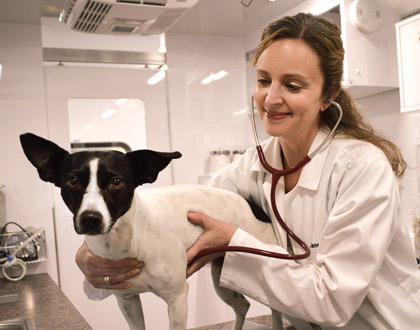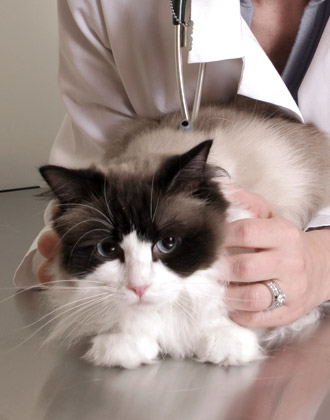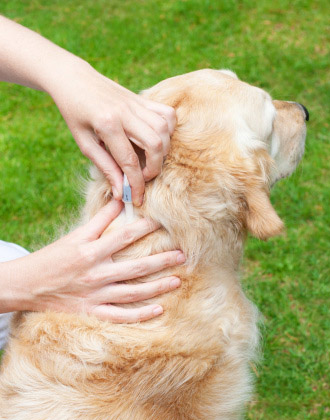Wellness Care in Occidental, California

The staff at Sonoma County Mobile Veterinary Hospital is committed to providing you and your pet the finest veterinary care possible. We're a welcoming, skilled and cost-conscious partner in the care of your beloved companions.
The veterinary team at Sonoma County Mobile Veterinary Hospital believes that prevention contributes to your pet's long term health and minimizes the lifetime cost of care. We strongly recommend routine wellness exams, vaccinations, regular lab work, deworming and fecal checks, as well as medications to prevent heartworm, fleas, and ticks to keep your pet in optimum health.
Despite the very best preventive care, a beloved pet may develop an illness or be injured. Our internal medicine and surgical expertise, as well as our advanced diagnostic capabilities and veterinary laboratory, ensure your pet receives a quick and accurate diagnosis. We take time to explain our diagnosis to you and provide you with various options for your pet's treatment.
Please take a look at the services we offer to learn why we believe they are important to the care and well-being of your pet. Then give us a call to set up an appointment or email us with questions today!
Wellness Examination
Wellness examinations are the same for your pet as the yearly physical you receive from your doctor. It's a chance for us to assess your pet's overall health, discuss any changes we see, educate and update you on advancements in veterinary care and is also an opportunity for you to discuss any of your concerns or ask questions.
Your pet's yearly wellness examination at Sonoma County Mobile Veterinary Hospital includes our commitment to:
- Examine your pet's teeth, throat, and oral cavity
- Check your pet's vision and examine the eyes
- Examine the ears for infection, ear mites, allergic reaction and other related health issues
- Examine the respiratory system
- Assess your pet's heart and evaluate cardiac function
- Test your pet's reflexes
- Palpate lymph nodes and abdomen
- Inspect the skin
- Palpate joints and muscles for arthritis and other orthopedic conditions
- Test to evaluate the function of internal organs and other systems
- Assess changes in your pet's body weight, appetite, urination and bowel habits
- Inquire as to your pet's activity level
- Palpate the skin for unusual growth developments
- Monitor your pet's blood count
- Utilize laboratory testing to detect early signs of Lyme or Heartworm disease
- Assess and evaluate general or specific changes in your pet's health since the last wellness visit
- Discuss preventive techniques with you, the pet owner
- Collect and examine fecal samples for signs of parasitic infestation
- Evaluate your pet for repetitive licking or biting in one area
- Assess your pet's hair/fur and check for matting
- Demonstrate to you, the pet owner, how to administer at-home medication
- Engage you, the pet owner, in conversation and answer your questions and concerns
Deworming and Fecal Check
Dangerous parasites are always present in the environment. We recommend regular fecal checks and deworming as the best way to prevent parasitic disease and the transmission of intestinal parasites to your pet and your family members.
Regular Blood Testing
A complete physical should include a blood test. Not only can a chemistry panel and blood count identify the presence of underlying disease processes, but these tests help create a baseline should your pet become ill between regular examinations.
At home, watch for subtle changes in your pet's body weight, appetite, water intake, urination and bowel habits, as well as general attitude and activity level. These changes may be signs of medical problems. Lumps and bumps under the skin may seem harmless, but can be cancerous. Ear infections, abscessed teeth, and gum disease are common, painful conditions that may not become obvious until seriously advanced. A comprehensive physical exam is the tool to evaluate your pet's health status and to help you make informed decisions about the care of your special companion.

Senior Pet Care
Congratulations! By taking the time to learn more about the special needs of your senior aged pet, you have taken the first step toward providing the best care for your friend in his or her golden years. Our team places an emphasis on senior care, and we're proud of the special interest we take in geriatric medicine and care of chronic disease.
As with humans, pets in their senior years — those of about seven years of age and older — begin to go through a gradual reduction of their physical capabilities. However, this process can be slowed and managed through proper veterinary care, thereby offering your beloved pet an extended period of vitality and good health. Additionally, preventative care tailored to your pet's age, lifestyle, risk factors and other elements can help prevent common diseases or detect them at early and more easily treatable stages.
There is also an important role for you to play as your pet's primary caregiver. While you cannot control age-related decline, you can influence your pet's activity level, living conditions, access to quality senior veterinary care, and daily nutrition. With guidance from Dr. Foley you can manage these factors to prolong your pet's good health, vitality, and increase his or her well-being, even as his or her pace slows a bit.
However, the best time to begin your pet's senior care program and recognize the need for a little extra TLC is well before age-related conditions begin to set in. We recommend regular senior wellness exams, which should include lab tests to detect the early signs of disease processes. Dental care at this point in life becomes even more important as well. We recommend routine dental exams and cleanings for all pets, but especially for those in their senior years. Diet and weight gain are also important issues to keep in mind. When you bring your pet in for a senior wellness visit, your veterinarian will evaluate his or her weight and offer recommendations based on what we find.
Vaccines
Due to the many recent discoveries and innovations in veterinary medicine, your pet can be protected against most major infectious diseases. Today, many immunizations and preventative treatments are available that did not exist a decade ago.
Vaccines are useful in preventing canine distemper, parvovirus, bordetella, rabies, Lyme disease, and other diseases in your dog and feline leukemia, panleukopenia, rabies, and feline immunodeficiency virus in cats. Our staff at Sonoma County Mobile Veterinary Hospital can assist you in deciding which preventative measures are necessary for your pet.
Up-to-date vaccinations play a large part in keeping your pet healthy and free from disease. However, not every pet requires the same series or frequency of vaccines. Dr. Foley tailors a vaccine protocol that is specific to your pet based on his or her lifestyle and recommendations from the American Veterinary Medical Association. Vaccine schedules are balanced to provide needed protection while not over-vaccinating your pet. Please contact us for more information about vaccinations.
Core Vaccines for Dogs and Cats
Core vaccines for dogs include Canine Distemper, Canine Adenovirus (hepatitis), Canine Parvovirus and Canine Parainfluenza. Combined into one injection, the vaccine is called DHPP. When Leptospirosis is added, it is called DHPPL. Rabies is also a core vaccine for dogs and is a requirement for all dogs living in the state of California.
Core vaccines for cats include Panleukopenia Virus, Feline Calicivirus, and Rhinotracheitis, also known as Herpes Virus. The vaccines are combined into one injection, called FVRCP. FVR is Feline Viral Rhinotracheitis, which causes respiratory infections; C is for Calicivirus, another upper respiratory infection and P is for Panleukopenia, also known as Feline Distemper. Rabies vaccine is also a core vaccine for cats.
Non-Core Vaccines for Dogs
Non-core vaccines for dogs include Bordetella and Lyme vaccines.
The proportion of infected dogs that develop clinical disease is far smaller than it is for humans. In contrast to human cases of Lyme disease, where three different stages are well known, Lyme disease in dogs is primarily and acute or subacute arthritis. The acute form may be transient and may recur in some cases. The devastating chronic stage in humans with systemic disease has rarely been seen in dogs.
Dogs show sudden lameness and sometimes signs of severe pain. One or more joints may be involved. Joints are often swollen, hot, and painful upon manipulation. Dogs may have fever and be off-feed and lethargic. Some become severely depressed and are reluctant to move. Lameness may recur after a period of recovery lasting several weeks.
We consider four criteria important in establishing the diagnosis of Lyme disease in dogs:
- History of exposure to ticks in an endemic area.
- Typical clinical signs (lameness with or without fever).
- A positive antibody test.
- A prompt response to antibiotic therapy.
Bordetella (B. bronchiseptica) is a bacteria commonly associated with respiratory infections in dogs. It is one of the more common bacterial causes of canine infectious tracheobronchitis – also known as kennel cough. This vaccine is strongly recommended if your dog attends day care, visits dog parks, boarding kennels or any other location where he/she comes into nose-to-nose contact with other dogs.
Bordetella is highly contagious, easily transmitted through the air or direct contact, and fairly resistant to destruction in the environment.

Internal Medicine
Sometimes one of the frustrations of dealing with a sick pet is that you cannot simply ask him/her what is wrong. Therefore, Sonoma County Mobile Veterinary Hospital has invested in the latest advanced diagnostic technology. When your pet is not well, we need to find out what is wrong. After performing a thorough examination, a series of diagnostic tests is often necessary in order to identify the medical condition.
Dr. Foley is very knowledgeable and has a large amount of expertise in diagnosing and treating complex internal medicine cases such as kidney, heart, respiratory, immune-mediated and endocrine diseases.
Puppy and Kitten Care
Bringing a new puppy or kitten into your home is always something to celebrate. They add energy and fun and are a source of unceasing affection as they bond with you and your family.
However, new pets require a little extra attention to ensure they get a good, healthy start at life. This means that comprehensive physical exams from Dr. Foley at key developmental stages are essential. Any time that you get a new pet, it's important to schedule an appointment right away so that we may review their prior medical records and make timely recommendations for appropriate wellness care.
Your puppy's or kitten's first visits with Sonoma County Mobile Veterinary Hospital are perhaps the most important. These initial visits are where you, Dr. Foley and your pet first meet and begin to form the relationship that lasts throughout the life of your pet. We take plenty of time with these visits to give your puppy or kitten a thorough examination, talk with you about concerns you may have, offer health care and training advice, and more.
Some of the issues discussed during your kitten's first visits include:
- Diet, including types of food that are best for cats' unique requirements
- Litter and litter box use
- Behavior
- Should my cat be allowed to go outdoors?
- Spaying and neutering recommendations
- Vaccine protocol
- Pet health insurance: Should I get pet health insurance? What should I look for in a company?
- Microchipping: Should I get this done? When is the best time to do this?
- Fecal exam and treatment for worms and other intestinal parasites
- Testing for Feline Leukemia Virus (FeLV) and Feline Immunodeficiency Virus (FIV)
- Fleas (treatment and prevention) and heartworm disease
Some of the issues discussed during your puppy's first visits include:
- Diet, including types of food to feed and guidelines on feeding intervals and quantities
- Housetraining
- Behavior
- Spaying and neutering: Is this best for my dog? If I decide to spay/neuter, when is the best time to have this done?
- Formulation of an individualized vaccine protocol.
- Pet health insurance: Should I get pet health insurance? What should I look for in a company
- Discussion about heartworm, fleas, and ticks
- Microchipping: Should I get this done? When is the best time to do this?
- Fecal exam and treatment for worms and other intestinal parasites
We take plenty of time during these visits to give your puppy or kitten a thorough examination, which includes detection of potential congenital problems, and offer health care and training advice. This is your new kitten or puppy and we're happy to answer all of your questions.

Flea and Tick Prevention
Fleas and ticks are virtually everywhere. Although they're a bigger problem in certain parts of the country and at specific times during the year, no cat or dog is completely safe from them. Fortunately, many safe and highly effective products are available. Fleas and ticks are more than a nuisance; they carry diseases dangerous to both you and your pet. Fleas can transmit tapeworms, and often you can see segments of the tapeworm in your pet's stool. Ticks, of course, are the main carriers of Lyme Disease and thus we recommend all dogs be vaccinated against Lyme disease.
Fleas are most abundant during the warm weather; however, if left untreated, they can be a nuisance year-round. Ticks tend to thrive in wooded areas or in high grass. It's is often difficult to keep your pets away from tick infested areas, so if they do go exploring, check them when they come inside.
Flea and tick problems can be avoided by using parasite prevention products that are available at our hospital. When used properly and according to our directions, these products are very safe and effective.
Heartworm Disease
Heartworm disease is a serious, life-threatening disease of dogs and cats. Mosquitoes spread the disease by injecting the parasite into your pet at the time of the bite. After the infected female mosquito bites your pet, the heartworm migrates through the bloodstream and moves to the heart and adjacent blood vessels, maturing to adults within 6-7 months in dogs and 8 months in cats. As many as 30 species of mosquitoes can transmit heartworms.
Until the early 1970s, the occurrence of heartworm disease in the United States was primarily confined to the southeastern part of the country. Today, heartworm disease is found almost everywhere in the continental United States.
Clinical symptoms of heartworm disease develop very slowly. Often symptoms are not noticeable until several years after the initial infection. Lack of energy and exercise intolerance are early symptoms. Coughing and difficulty breathing are both common symptoms. As the disease progresses, most dogs develop congestive heart failure. Dogs often collapse in the final stage of the disease. In cats, the symptoms of heartworm disease are similar to those of feline asthma. Some cats may exhibit no signs of the disease, while others may suddenly die.
Because heartworm disease is increasing in frequency and is a serious and deadly disease, we recommend that your dog be tested annually. This test is highly accurate, and we often have the results in less than 10 minutes.
Heartworm disease prevention is simple. For dogs, a once-a-month heartworm preventative can be given as a tasty, chewable treat. This same chewable medicine prevents not only heartworms from developing, but also kills and prevents most other types of worms that can infect your dog. Cats are protected by applying a drop of heartworm prevention liquid to the skin once a month. We recommend this to prevent heartworm disease as well as fleas, ear mites, and other types of worms that can infect your cat.
If you would like to have your pet tested for heartworm disease, or if you would like additional information on how best to protect your pet from this dangerous parasite, please call Sonoma County Mobile Veterinary Hospital today at (707) 874-1188 for an appointment.
